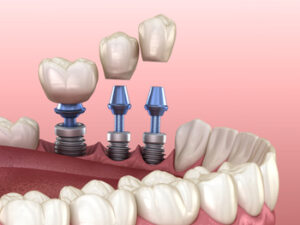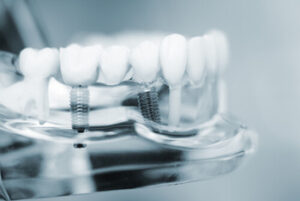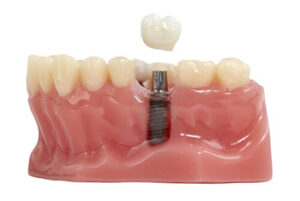Single tooth implants have emerged as a revolutionary solution for missing teeth in dental care. This detailed exploration aims to shed light on the cost of single tooth implants, delving into the nuances of dental implants and related procedures. For those considering this option, understanding the financial aspect is as crucial as comprehending the medical one.
The Basics of Dental Implants
Dental implants are more than replacements for missing teeth; they are a marvel of modern dentistry that replicates the form and function of natural teeth. At their core, dental implants are typically made from titanium, a material chosen for its strength and its unique ability to fuse with the bone – a process known as osseointegration. This fusion gives the implant its stability, akin to the roots of natural teeth.
The Role of Osseointegration
Osseointegration is a pivotal aspect of the dental implant process. When the titanium post is inserted into the jaw bone, the bone cells gradually integrate with the implant’s surface, creating a bond that mimics that of natural teeth roots.
This process is crucial for the implant’s stability and maintaining the integrity of the jaw bone, preventing the bone loss that often accompanies missing teeth.
Types of Dental Implants
When discussing dental implants, it’s important to recognise that there are various types, each tailored to specific needs. The most common are endosteal implants placed directly into the jawbone.
Another type, subperiosteal implants, which sit atop the jawbone but under the gum, are less common and typically used when a patient lacks sufficient healthy jawbone and doesn’t want to undergo a bone augmentation procedure.
The Significance of Customisation
Each dental implant is a bespoke creation tailored to fit the unique contours of the patient’s mouth. This customisation is crucial, not only for comfort but also for ensuring the functionality of the implant.
The design process involves careful consideration of the implant’s size, shape, and specific location in the jawbone, ensuring that it perfectly mimics the missing tooth in appearance and function.
Dental Implant and Overall Oral Health
A significant advantage of dental implants over other tooth replacement options, like dental bridges or dentures, is their positive impact on oral health. By replacing the root and the crown of the missing tooth, dental implants prevent the adjacent teeth from shifting, a common issue with gaps in the dental arch. Moreover, they stimulate and preserve the jaw bone, preventing the bone deterioration that often occurs with missing teeth.
The journey to understanding dental implants is intricate, reflecting the complexity and sophistication of this dental procedure.
Dental implants represent a significant advancement in dental technology, from their titanium composition and the wonders of osseointegration to their customised design and positive impact on oral health.
They are not just a solution for missing teeth but a testament to the strides made in modern dentistry, offering a blend of functionality, aesthetics, and longevity unparalleled by other dental treatments.
Factors Influencing Single Tooth Implant Cost
When considering the journey towards acquiring a single tooth implant, one of the most pivotal factors is understanding the cost involved. It’s a multifaceted aspect, influenced by many variables, each contributing to the final price tag. Here, we delve into these factors, offering insights into what goes into determining the cost of a single tooth implant.
Geographic Variations: A Key Determinant
The location where you receive your dental implant can significantly impact the cost. This variation often reflects the differing living costs and operational expenses in various regions.
For example, dental services in metropolitan areas might carry a higher price tag than those in more regional or rural areas, attributable to the higher overheads in urban settings.
Expertise in Dental Implant
The qualifications and experience of your dentist play a crucial role in not only the success of the procedure but also its cost.
Highly skilled dentists with a track record of successful implantations often charge more, reflecting their expertise and the demand for their services. It’s important to balance the cost with the level of expertise, as this is a critical factor in the long-term success and health of the implant.
Material Quality and Type
The cost is also influenced by the materials used for the implant and the crown. Standard materials like titanium are preferred for their durability and compatibility with body tissues, but they can be more costly.
Additionally, the choice of crown material—be it porcelain, zirconia, or composite—varies in price, offering different aesthetic and functional benefits.
Additional Procedures: When More is Required
The need for additional procedures, such as bone grafting or sinus lifts, can often escalate the overall cost. These procedures are essential if the patient lacks the adequate jaw bone to support the implant.
Undertaking these additional steps ensures the stability and longevity of the implant but also adds to the total financial investment.
The Impact of Technology and Techniques
Advancements in dental implant technology and techniques can further influence the cost. Innovations like 3D imaging and computer-guided surgery offer enhanced precision and success rates but may increase the price due to the sophisticated equipment and expertise involved.

Understanding these factors helps in making an informed decision, ensuring that the investment in your dental health is both wise and beneficial in the long term.
Dental Implant Procedure: What to Expect
Embarking on getting a dental implant can be an intricate process involving multiple steps and stages. Understanding what to expect during this procedure can significantly ease apprehensions and prepare you for a successful dental implant experience.
Initial Consultation: Laying the Groundwork
The journey begins with an initial consultation. During this session, your dental professional will thoroughly examine your oral health. This assessment typically involves dental X-rays or 3D images to evaluate the condition of your jaw bone and the positioning of the surrounding teeth.
It’s also an opportunity to discuss your medical history and any concerns, ensuring a treatment plan tailored to your specific needs.
Custom Treatment Planning
Post the initial assessment, the dental team will devise a customised treatment plan. This plan considers factors like the number of teeth to be replaced and the condition of your jawbone.
It’s a critical step where the implant type, materials, and any additional procedures (like bone grafting) are determined.
The Dental Implant Surgery: A Detailed Process
The actual placement of the dental implant is a surgical procedure and is typically done under local anaesthesia to ensure your comfort.
During the surgery, the dentist will make an incision in the gum to expose the bone, where holes are drilled to place the implant post securely. This post acts as a new root for your tooth.
The healing process begins after the implant is placed, which can take several months. This period allows for osseointegration, where the implant fuses with the jawbone.
The Healing Period: Osseointegration
Osseointegration is a pivotal phase in the dental implant procedure. During this period, it’s crucial to maintain good oral hygiene and follow any specific instructions from your dentist. While the bone heals and integrates with the implant, a temporary tooth replacement option can be used for aesthetic and functional purposes.
Adding the Abutment
Once osseointegration is complete, a minor surgery might be required to place the abutment – the piece where the crown will eventually attach. This procedure is typically less complex and may be done under local anaesthesia.
Choosing and Placing the Crown
The final step involves choosing and placing the crown, which is the tooth’s visible part. You’ll have options between a removable crown (similar to a removable denture) or a fixed one, which is permanently screwed or cemented onto the abutment. This step requires meticulous planning to ensure the new tooth matches your natural teeth in colour and shape.
Aftercare and Follow-Up
Post-procedure care is crucial for the success of your implant. Regular dental check-ups, good oral hygiene practices, and avoiding harmful habits like smoking can extend the life of your implant. Your dental team will provide comprehensive guidance on how to care for your new implant and surrounding teeth.
Getting a dental implant is a journey that requires patience and careful planning. Each step, from the initial consultation to the final placement of the crown, is critical for ensuring the long-term success of the implant.
By understanding what to expect and following the guidance of your dental professional, you can look forward to a functional and aesthetically pleasing outcome that enhances your quality of life and oral health.
Decoding the Starting Costs of Single Tooth Implants
Understanding the starting costs of single tooth implants is crucial for anyone considering this dental procedure. The initial price tag is often a primary concern, and breaking down what this figure typically entails is essential. Let’s explore the components that make up the starting costs of a single tooth implant.
Initial Consultation: The First Step
The journey towards a dental implant begins with an initial consultation. This appointment, which often factored into the overall cost, involves a comprehensive oral health examination, including necessary X-rays or 3D scans.
The cost of this consultation can vary based on the complexity of your case and the technology used.
The Base Price of the Implant Procedure
The ‘starting cost’ typically refers to the base price of inserting the implant. This cost encompasses the surgical procedure to place the titanium post into the jawbone.
It’s important to note that this price is just a segment of the total cost, focusing solely on the implant placement without additional elements like the abutment or crown.
Additional Components: Abutment and Crown
After the implant post is placed and has fused with the jawbone, an abutment, and a dental crown are required to complete the procedure. The abutment acts as a connector between the implant and the crown. The crown, custom-made to match your natural teeth, is the visible part of the implant. Both these components, essential for the functionality and aesthetics of the implant, add to the overall cost.
The Role of Material Choices
The materials chosen for the implant, abutment, and crown significantly impact the starting costs. Titanium and zirconia are common materials for the implant post, with varying price points. The crown can be made from porcelain, ceramic, or a composite material, each with different costs.
Potential for Additional Procedures
In some cases, preparatory procedures like bone grafting or a sinus lift may be necessary before placing the implant. These procedures, crucial for patients with insufficient jaw bone, contribute to the initial cost. It’s important to factor in these potential additional costs when considering the starting price of a dental implant.
Geographic Location and Clinic Overheads
The region where you get the implant and the specific clinic’s operational costs can influence the starting price. Clinics in metropolitan areas might have higher starting costs due to increased overheads than in regional areas.
The dental implant costs encompass a range of components, from the initial consultation to the implant, abutment, and crown materials. It’s also influenced by geographical location and the need for any additional preparatory procedures. Understanding these aspects is key to forming a realistic expectation of the financial commitment involved in getting a dental implant. It’s not just paying for a product but investing in a complex medical procedure that enhances oral health and quality of life.
Financial Considerations and Dental Health Insurance Benefits
Investing in a dental implant is a significant financial decision, and understanding the landscape of costs and insurance benefits is crucial. Here, we delve into the complexities of managing the financial aspects of teeth implants, including how dental health insurance may play a role.
Understanding Out-of-Pocket Costs
The out-of-pocket costs for dental implants can be substantial. While the initial expense might seem daunting, viewing this as a long-term investment in your oral health is important. This dental implant cost can vary based on the complexity of the procedure, the materials used, and the dentist’s fees. Getting a detailed breakdown of all the costs involved is advisable before beginning the treatment.
Insurance Coverage: A Complex Landscape
Dental health insurance coverage for dental implant placement can be complex and varies greatly between policies. Many insurance plans consider dental implants a cosmetic procedure and may not offer extensive coverage. However, some policies may cover costs, such as the crown or the surgical procedure. It’s essential to thoroughly review your insurance policy and speak directly with your insurance provider to understand what aspects of the implant procedure are covered.
If your insurance covers only a part of the straight-tooth implant placement, you must plan for the remaining out-of-pocket expenses. This might include the initial consultation, the implant surgery, and additional procedures such as bone grafting. Understanding the specifics of your coverage will help you budget more effectively for the entire process.
Financing Options and Payment Plans
Many dental clinics offer financing options or payment plans to help manage the cost of dental implants. These plans can range from short-term payment arrangements to longer-term financing options, potentially making the procedure more accessible. It’s worth discussing these options with your dental clinic to find a plan that suits your financial situation.
The Role of Health Savings Accounts (HSAs) and Flexible Spending Accounts (FSAs)
For those with Health Savings Accounts (HSAs) or Flexible Spending Accounts (FSAs), these can be viable options to offset some of the costs. These accounts allow you to use pre-tax dollars for medical expenses, including dental procedures. Check the specifics of your account to understand how it can be applied to your dental implants cost.
Long-Term Value vs Immediate Cost
When considering the cost of dental implant treatment, weighing the immediate financial impact against the long-term value is important. Dental implants are a durable and lasting solution, often with a lifespan of many years, potentially making them more cost-effective in the long run compared to other dental procedures like bridges or dentures.
Conclusion
The journey to a single dental implant combines advanced dental procedures and careful financial planning. While the cost can be significant, the long-term benefits for dental health and quality of life are undeniable. Consulting with dental implant experts and thoroughly understanding the entire process, including dental implant surgery and aftercare, is key to making an informed decision.
The right choice depends on individual needs and circumstances, whether it’s a single tooth implant or full mouth dental implants. Remember, implant dentistry is not just about replacing missing teeth; it’s about restoring confidence and functionality.
Don’t let the complexities of dental implant procedures deter you from achieving the smile you deserve. We invite you to contact us at DDSS, where your dental health is our top priority. Contact us today to schedule a consultation and take the first step towards a brighter, healthier smile.
Call us to start your journey towards your best smile!
Sydney CBD: (02) 8294 5812
Gosford: (02) 8294 8656
Eastwood: (02) 9299 8842
Tugerrah: (02) 8207 3164
Your journey to dental wellness begins with a simple phone call. Contact us at any of our locations, and let us help you embark on a confident and healthy smile.
Note: Any surgical or invasive procedure carries risks. Before proceeding, you should seek a second opinion from an appropriately qualified health practitioner.
References:
ncbi.nlm.nih.gov/books/NBK470448/
colgate.com/en-za/oral-health/implants/what-are-dental-implants








